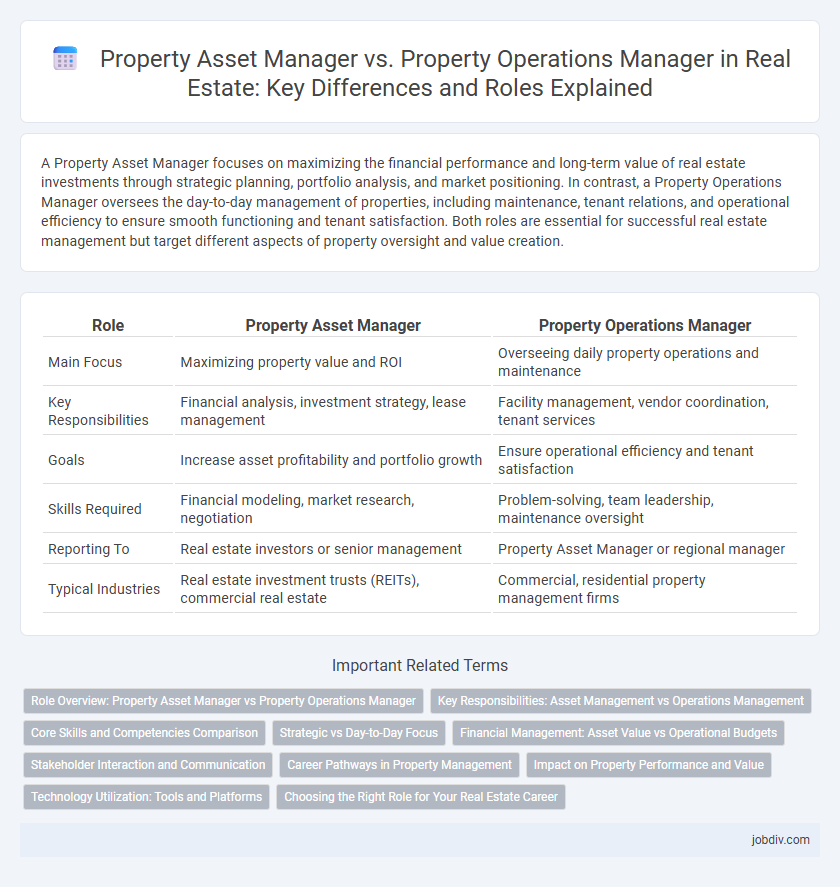A Property Asset Manager focuses on maximizing the financial performance and long-term value of real estate investments through strategic planning, portfolio analysis, and market positioning. In contrast, a Property Operations Manager oversees the day-to-day management of properties, including maintenance, tenant relations, and operational efficiency to ensure smooth functioning and tenant satisfaction. Both roles are essential for successful real estate management but target different aspects of property oversight and value creation.
Table of Comparison
| Role | Property Asset Manager | Property Operations Manager |
|---|---|---|
| Main Focus | Maximizing property value and ROI | Overseeing daily property operations and maintenance |
| Key Responsibilities | Financial analysis, investment strategy, lease management | Facility management, vendor coordination, tenant services |
| Goals | Increase asset profitability and portfolio growth | Ensure operational efficiency and tenant satisfaction |
| Skills Required | Financial modeling, market research, negotiation | Problem-solving, team leadership, maintenance oversight |
| Reporting To | Real estate investors or senior management | Property Asset Manager or regional manager |
| Typical Industries | Real estate investment trusts (REITs), commercial real estate | Commercial, residential property management firms |
Role Overview: Property Asset Manager vs Property Operations Manager
A Property Asset Manager focuses on maximizing the financial performance and value appreciation of real estate investments through strategic planning, budgeting, and market analysis. In contrast, a Property Operations Manager oversees the day-to-day property maintenance, tenant relations, and operational efficiency to ensure smooth facility functioning. While asset managers prioritize long-term investment outcomes, operations managers handle on-the-ground property management tasks.
Key Responsibilities: Asset Management vs Operations Management
Property Asset Managers focus on maximizing property value through strategic planning, financial analysis, and investment management, including budgeting, capital improvements, and market positioning. Property Operations Managers handle day-to-day functions such as tenant relations, maintenance coordination, lease administration, and ensuring compliance with safety and regulatory standards. The division of responsibilities emphasizes asset managers targeting long-term profitability and value enhancement, while operations managers prioritize efficient facility management and tenant satisfaction.
Core Skills and Competencies Comparison
Property Asset Managers excel in financial analysis, investment strategy, and portfolio optimization to maximize property value and returns. Property Operations Managers specialize in facilities management, tenant relations, and maintenance coordination, ensuring efficient daily operations and tenant satisfaction. Core competencies differentiate with asset managers focusing on market trends and risk management, while operations managers emphasize operational efficiency and compliance.
Strategic vs Day-to-Day Focus
A Property Asset Manager prioritizes strategic planning, financial performance, and long-term value maximization of real estate investments. In contrast, a Property Operations Manager concentrates on the day-to-day management, maintenance, tenant relations, and operational efficiency of properties. The Asset Manager drives high-level decision-making, while the Operations Manager ensures smooth daily property functionality.
Financial Management: Asset Value vs Operational Budgets
Property Asset Managers prioritize maximizing asset value through strategic financial planning, market analysis, and investment optimization, ensuring long-term capital appreciation and return on investment. Property Operations Managers focus on managing operational budgets, controlling expenses, and maintaining cost efficiency to support day-to-day property functions and tenant satisfaction. Effective collaboration between both roles balances asset valuation growth with budget adherence, enhancing overall property financial performance.
Stakeholder Interaction and Communication
Property Asset Managers prioritize strategic communication with investors and key stakeholders to maximize portfolio value and ensure financial performance aligns with investment goals. Property Operations Managers focus on day-to-day coordination with tenants, maintenance teams, and service providers to address operational issues and maintain property functionality. Effective stakeholder interaction for Asset Managers involves reporting and negotiation at the ownership level, while Operations Managers emphasize responsive communication and problem-solving at the tenant and vendor level.
Career Pathways in Property Management
Property Asset Managers focus on maximizing property value through strategic financial planning, investment analysis, and portfolio management, typically advancing from roles in real estate finance or investment analysis. Property Operations Managers oversee day-to-day building maintenance, tenant relations, and operational efficiency, often progressing from facility management or on-site supervisory roles. Career pathways in property management allow professionals to transition from operational roles to asset management positions by gaining expertise in market trends, financial reporting, and long-term asset strategy.
Impact on Property Performance and Value
Property Asset Managers focus on maximizing a property's financial performance and long-term value through strategic planning, investment analysis, and market positioning. Property Operations Managers oversee day-to-day activities including maintenance, tenant relations, and rent collections to ensure smooth operations and tenant satisfaction. Effective collaboration between both roles directly enhances property performance by aligning strategic financial goals with efficient operational execution.
Technology Utilization: Tools and Platforms
Property Asset Managers leverage advanced analytics platforms and portfolio management software to optimize investment performance and strategic decision-making. Property Operations Managers utilize building automation systems, maintenance management software, and tenant communication apps to streamline daily operations and enhance tenant satisfaction. Both roles increasingly depend on integrated technology solutions, such as IoT devices and AI-driven data analytics, to drive efficiency and operational excellence in real estate management.
Choosing the Right Role for Your Real Estate Career
Property Asset Managers focus on maximizing the value and return on real estate investments through strategic planning, financial analysis, and portfolio management. Property Operations Managers oversee daily property operations, maintenance, tenant relations, and ensure compliance with safety regulations to maintain property performance. Choosing the right role depends on whether you prefer strategic investment oversight with a focus on financial outcomes or hands-on property management and operational efficiency.
Property Asset Manager vs Property Operations Manager Infographic

 jobdiv.com
jobdiv.com